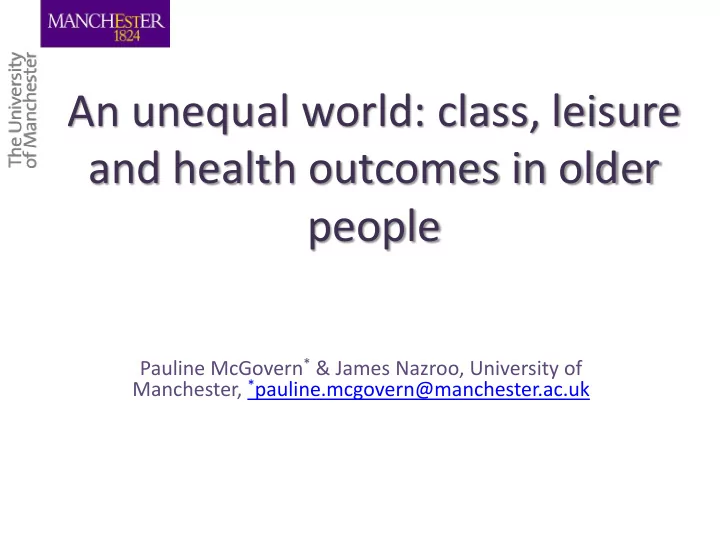

An unequal world: class, leisure and health outcomes in older people Pauline McGovern * & James Nazroo, University of Manchester, * pauline.mcgovern@manchester.ac.uk
Associations between occupational class and health Work Occupational Social status Health class ladder Theatre/opera Museum/art Cinema Volunteering Committee Social network Health behs R 2 = 36.3% Wealth RMSEA = .081 NFI = .961
How much of the effect of occupational class on health goes through leisure pursuits? Occupational Social status Health class ladder Theatre/opera Museum/art Cinema Volunteering Committee Social network Health behs Effects on health (total standardised betas): Occupational class = .117 (100%) Direct = .040 (34%) Via leisure pursuits = .043 (37%) Via cultural participation = .025 (21%) Via social/civic participation= .007 (6%) Via health behaviours = .011 (9%)
Life events data: Class, leisure and health The part that art has played in my life and the understanding, influence that it has given me in helping other people as well as myself. Since retirement, I have been able to develop my own artwork in ceramics and sculpture, using new media and learning new skills. Case 50183, Manager/Professional, female, age = 80 years, wealth = £446,678.00, SSS = 7, self-rated health = good at baseline, good in Wave 3 My mother was a great person for home crafts – cooking etc. but particularly sewing which I was taught and still carry on. Plus knitting, these crafts are most important and have been to my life since age 12 years. Case 50360, Intermediate, female, age = 75, wealth = £195,000.00, SSS = 4, self-rated health = very good at baseline, very good in Wave 3
Conclusions The evidence suggests that leisure is important in maintaining structures of inequality for older people in England. Leisure is one element in the class position of older people and is linked to health status. Within leisure, cultural pursuits are associated with positive health outcomes. Museums are good for the health! Even in a recession, this may be a reason to maintain arts funding.
Recommend
More recommend